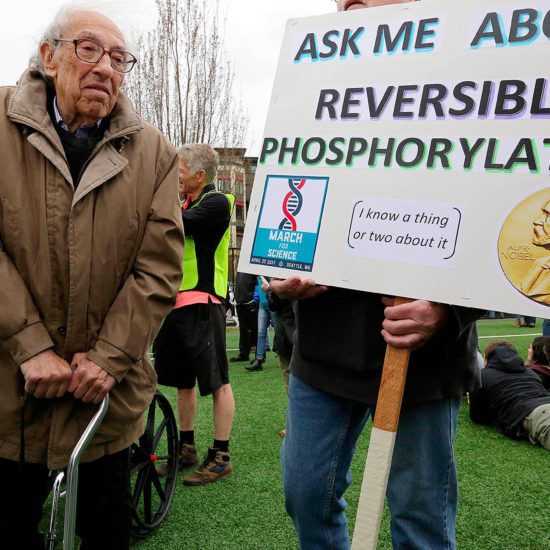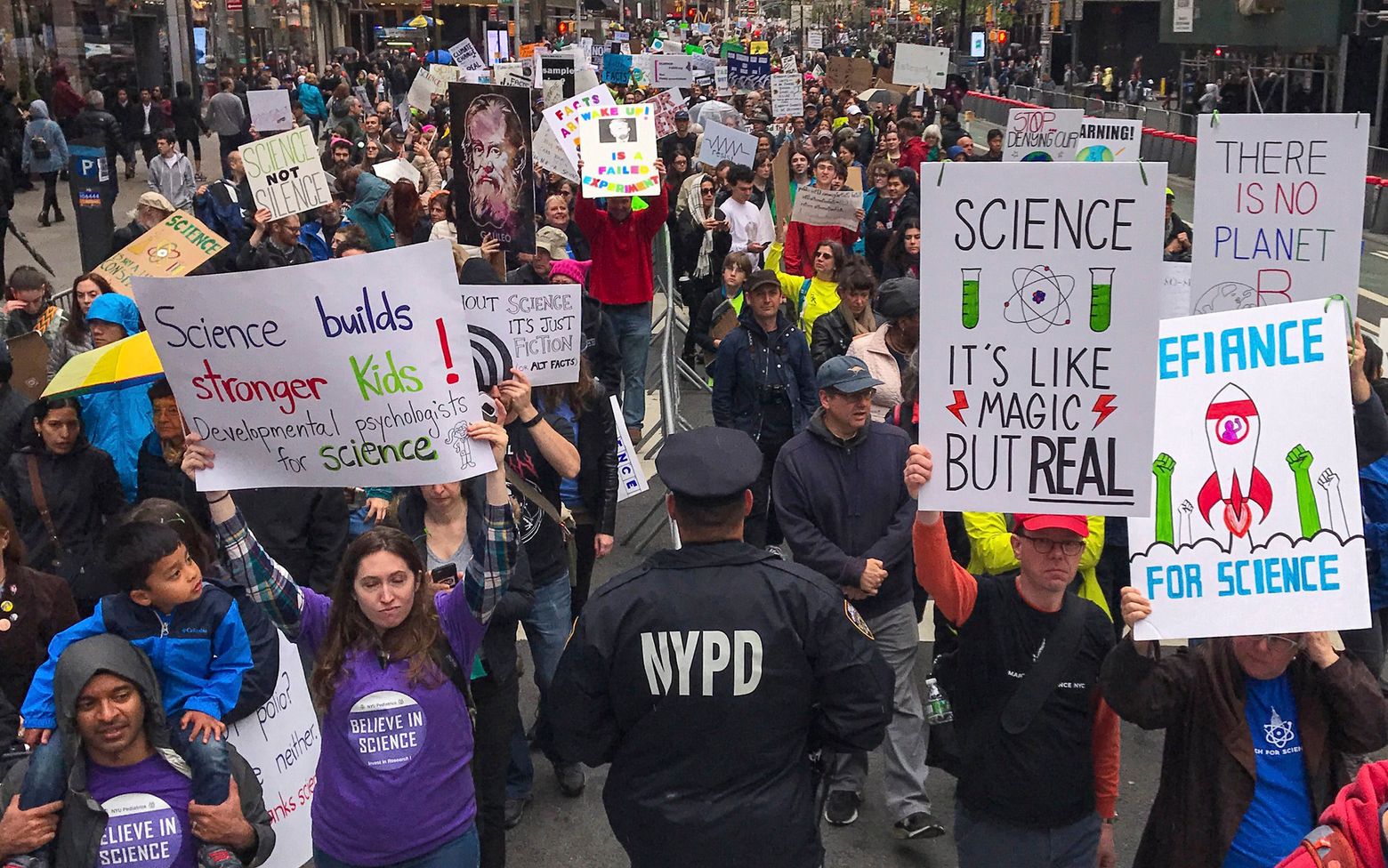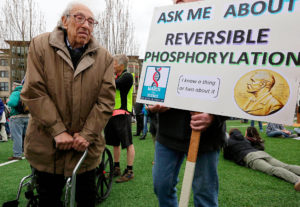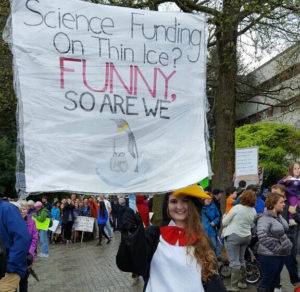

I won’t be out marching on Saturday
On Saturday, UW faculty took very different paths in the March for Science. Some of us stood aside, concerned that the March might politicize science, others celebrated science by joining with the the crowd marching in the Seattle rain.
Cliff Mass was among those who stayed away. Cliff is well known as an outspoken advocate for science from his podium as a weatherman on the radio and the Cliff Mass Blog. The blue text below comes from Cliff’s blog.

The Seattle March was much different from the the anti Trump rally Cliff feared. It was a march FOR science, a rally for truth and rationality in the era of alt truth. As for the UW, many students and faculty appeared .. the best celebration of the UW I have seen in my 47 years on campus! I saw many colleagues from across campus ….. . social sciences, physics, public health, Jackson School, medical school, AAUP, student groups. Even Eddy Fischer, now 97, came… exciting many by the presence of a Nobel Laureate. From other parts of Seattle’s intelligentsia, I talked with writers and artists… all supporting science! Alongside the egg headed elite were students, parents with children, survivors if cancer… You know “folks.” The media are estimating that several thousands of us showed up! Hardly a corporatism or self serving voice!
There are many reasons why the Science March was such a bad idea.
(1) The Science March is overly political and endangers the relationship between science and society.
Science play a critical role in civic life, acting as non-political source of information about the the natural environment and as the generator of useful technologies. Scientists are credible only when their information is considered unbiased and not politically motivated. The lack of political bias is why both sides of the aisle have supported the nation’s large scientific establishment over many years.
The Science March is clearly political and is an attempt to put pressure on the Trump administration. It will be seen as political by everyone and particularly those it means to pressure. Furthermore, the major concern driving this march is not science in general, but of the Trump administration’s appointments and future actions regarding climate science and fossil fuel regulations.
(2) The Science March Makes Science a Target
The march will identify supporters of science as being against the Trump administration, putting a big target on the back of the U.S. science establishment.

Marchers in Seattle were not alone, Thousands of scientists and science advocates marched in Washington, D.C., Chicago, Berlin and nearly 600 other cities worldwide.

Right in the middle of the march was Eddy Fischer, a 97-year-old man in a wheelchair. Ed is professor emeritus of biochemistry at the University of Washington and Nobel Prize co-winner in 1992 for physiology or medicine. He still goes to the school twice a week to meet with colleagues and discuss research. “Damn right, I’m in this march,” he said. Of the Trump administration, Fischer noted, “I know very little about politics. I’m appalled by some of the statements coming out of them.
I have just finished reading my third book on Donald Trump. One thing is clear: he tends to act very aggressively against those who cross him, and particularly those that attack his public image. Do science supporters really want to provoke him unnecessarily and to little advantage?
Furthermore, there is no reason to think that Donald Trump is anti-science in general or that he really has any strong feelings about science. His anti-climate rhetoric might be similar to his pro-Russian talk: something that might rapidly alter as circumstances change. Do science supporters really want to push him into a corner?
(3) Republicans are Not Anti-Science and Can Protect Most Science If They Are Given a Chance.
Science research has generally done well when Republicans have been in control. For example, climate research funding went up substantially during the last Bush administration. Recently, the Weather Research and Forecasting Innovation Act passed the Republican-controlled Senate and House with overwhelming support. I have talked to a number of Republican staffers on critical House committees who told me that since they control the “purse” they could protect most of the science establishment.

Suzanne Delbene was the only WA state Congressional Representative to show up for the March. She is a great supporter of the UW with deep roots extending from before her election. Even Pramila Jayapal, the Congresswoman from Seattle itself, did not show up. If we agree with Cliff that we need to be not “political,” how do we get the same support from all of the delegation?
Climate research is only a small part of the Federal scientific portfolio. Having questions about climate issues does not make one generally anti-science.
(4) The March will Fuel Partisanship and Polarization in the Nation
A key problem in the nation has been the polarization of the population and Congress. The moderate center of the country has been severely weakened, and a cultural divide has developed between the liberal coasts and the conservative interior. Between haves and have nots. Will a large protest march for science help bridge this divide? Or will it identify scientists with other, generally left-leaning, protest groups? Will those hurting economically that voted for Trump be more likely to support science after a protest? I suspect not.
(5) We Really Don’t Know What the Current Congress Will Do Regarding Science Budgets
Congress has not passed a budget yet, so there is little information about what cut-backs or rebudgeting will occur. Why protest without knowing whether there will be significant reductions and in what areas?

Gerry Pollet, State Representative at State Representative – 46th District (North Seattle): “Great to see so many from our UW family here understanding the needs to fund, support, teach science. ….. when I hear faculty or scientists say they and their programs have no view about politics, I say that’s the result of not recognizing their privilege, and those that fight for their funding, and to extend the right to education to all.
(6) The March Does Not Have Clear, Explicit Goals.
Go to the the March on Science website. Try to figure out what they are marching to change. According to their website the March is a “first step of a global movement to defend the vital role science plays in our health, safety, economies, and governments.” Who is trying to reduce this “vital role?” What actions exactly are being called for?
(7) The March Organizers Will Not Control the Message
Overtly political or damaging messaging could easily be presented during the march. What is to going to stop anti administration signage? What happens if violent or disruptive protestors join the marches?
(8) There Weren’t Marches When Democratic Administrations Distorted Science and Particularly Climate Science
The political nature of this march is highlighted by the fact that there was no call for protecting science or marches when Democratic administrations played fast and loose with science. A good example was the sensational and unsupportable claims of the Obama administration science adviser (John Holdren) that eastern U.S. cold waves were caused by global warming. Demonstrably wrong, but few protested this obvious distortion and politicization of science. Or the claims by NY Govenor Cuomo that Hurricane Sandy was the result of climate change. Both political parties have distorted or miscommunicated science when it was in their political interests.

Seattle: Marching for Science in our gentle rain
A Better Approach
Instead of marching and being seen as opponents of the current administration, scientists and their supporters would be far more effective if they greatly increased their outreach to the community, communicating both the process and results of science.
Scientists should go into the community and talk about their science. Speak at local libraries, in schools, and fraternal organizations. Folks are extraordinarily interested in what we (scientists) have to say. Make an effort to connect with political leaders. Use social media (like blogs!). Nothing is more powerful than person to person contact. Help increase science literacy. In the long term, public understanding of science and the motivations of scientists is the most powerful tool for protecting the health of the nation’s science enterprise.
Worried that some folks feel climate change is a hoax? A good reason to have climate scientists enhance active outreach into communities doubting the science.
I won’t be out marching on Saturday, but I will continue my science outreach using this blog, my radio show on KNKX, and talks at local groups. And yes, by continuing do my science, including the determination of the regional impacts of global warming.

Pearl Wellington is a UW student who does research with the Penguin Sentienel Lab. (GeekWire Photo / Lisa Stiffler)
Let me end, by saying that there is nothing wrong with marches against the current administration or the current Republican leadership in Congress. But don’t involve science in it. If folks are honest, they would admit that this is basically a political protest against the current leadership in DC. Perhaps the most problematic leadership in the history of our country. So have a march, but don’t use science as a cover, and don’t put science at risk.
Marches like this don’t build bridges. And in a highly polarized society, bridges are desperately needed. Several of us have built bridges in the area of weather prediction, and this week the Weather Forecast and Research Innovation Bill was signed into law. Let’s build bridges in the area of climate change. It can be done if we have the wisdom and patience to do so.



